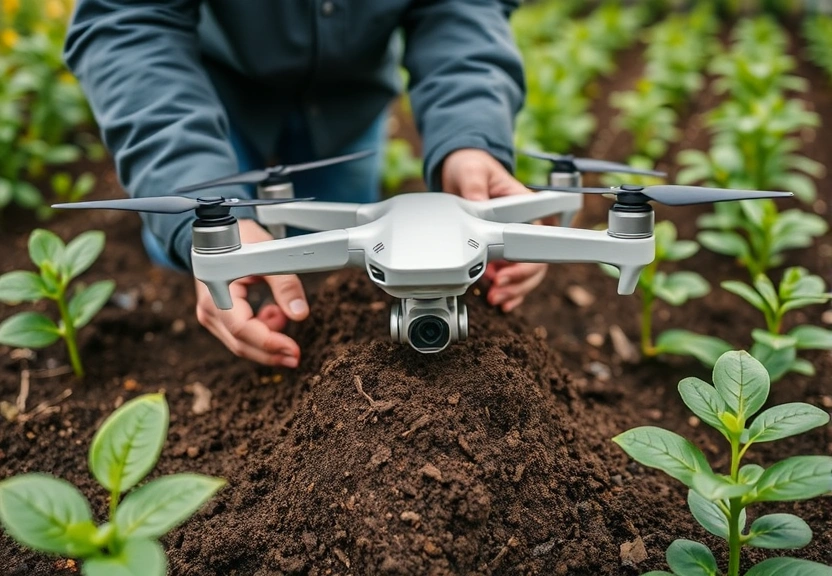Unlocking Soil Health and Drone Technology at Alcorn’s Garden Workshop

Unlocking Soil Health and Drone Technology at Alcorn’s Garden Workshop
On a bright Friday morning in Vicksburg, Mississippi, the Alcorn State University Extension Program brought together community members for an enriching experience at Julia’s Memorial Community Garden. The event, titled “Let’s Grow Together,” attracted local residents eager to learn about sustainable gardening practices and the intersection of technology and agriculture. With a focus on soil health and the integration of drone technology, the workshop aimed to equip participants with essential knowledge and skills for improving their gardening efforts.

This workshop not only highlighted the importance of healthy soil as the foundation for successful gardening but also demonstrated how modern technology, such as drones, can enhance agricultural practices. Attendees were introduced to various techniques for building and maintaining soil health while exploring innovative ways to monitor and manage their gardens using drone technology.
The Importance of Soil Health in Gardening
Soil health is a critical factor in determining the success of any gardening endeavor. Healthy soil supports plant growth, aids in water retention, and acts as a habitat for diverse microorganisms. Understanding soil health is essential for gardeners who wish to cultivate a thriving ecosystem in their gardens.
What is Soil Health?
Soil health refers to the soil’s capacity to function as a living ecosystem that sustains plants, animals, and humans. A healthy soil environment promotes biological diversity, enhances nutrient cycling, and improves soil structure. Key aspects of soil health include:
- Soil Organic Matter: The presence of organic materials that improve soil fertility.
- Microbial Activity: The diversity and activity of soil microorganisms that contribute to nutrient cycling.
- Soil Structure: The arrangement of soil particles that affects water infiltration and root development.
- Nutrient Availability: The presence of essential nutrients in forms that plants can absorb.
Building Healthy Soil
During the workshop, participants learned practical techniques for enhancing soil health, including:
- Composting: Utilizing kitchen scraps and yard waste to create nutrient-rich compost.
- Crop Rotation: Alternating different crops in a specific sequence to improve soil fertility.
- Cover Cropping: Planting cover crops to prevent soil erosion and enhance organic matter.
- Mulching: Applying organic or inorganic materials to the soil surface to retain moisture and suppress weeds.
Integrating Drone Technology in Agriculture
As technology continues to evolve, its application in agriculture has become increasingly significant. Drones have emerged as powerful tools that can assist gardeners and farmers in various ways, enhancing efficiency and productivity.
The Role of Drones in Agriculture
Drones can be utilized in multiple facets of agricultural management, including:
- Soil Analysis: Drones equipped with sensors can analyze soil conditions from above, providing valuable data on moisture levels and nutrient deficiencies.
- Crop Monitoring: Drones can capture high-resolution images of crops, allowing for early detection of diseases and pests.
- Precision Agriculture: Drones can assist in applying fertilizers and pesticides more accurately, minimizing waste and environmental impact.
- Aerial Mapping: Drones can create detailed maps of fields, helping farmers plan crop rotations and irrigation systems.
Benefits of Using Drones in Gardening
For community gardeners, the use of drone technology offers several advantages:
- Time Efficiency: Drones can cover large areas quickly, saving time compared to traditional methods.
- Data-Driven Decisions: Access to real-time data enables gardeners to make informed decisions regarding crop management.
- Cost Savings: Improved resource management through precision agriculture can lead to cost reductions.
- Enhanced Yield: By optimizing growing conditions, gardeners can potentially increase crop yields.
Hands-On Experiences at the Workshop
The workshop at Julia’s Memorial Community Garden was designed to be interactive, allowing participants to engage directly with the concepts being taught. Attendees had the opportunity to:
- Participate in soil testing demonstrations to assess soil health.
- Learn about various drone technologies and their applications in agriculture.
- Engage in group discussions on sustainable gardening practices.
- Network with fellow gardeners and agricultural experts.
Expert Insights
Expert speakers from Alcorn State University shared valuable insights into the latest advancements in soil health research and drone technology. Their presentations emphasized the importance of community involvement in sustainable agricultural practices and the role of education in fostering a new generation of environmentally conscious gardeners.
Frequently Asked Questions (FAQ)
1. What is the significance of soil health in gardening?
Soil health is crucial for plant growth, fertility, and overall garden productivity. Healthy soil supports nutrient cycling and retains moisture, creating a sustainable environment for plants.
2. How can I improve the health of my garden soil?
You can improve soil health by incorporating compost, practicing crop rotation, using cover crops, and applying mulch to enhance moisture retention and reduce weeds.
3. What are the benefits of using drones in gardening?
Drones offer time efficiency, data-driven insights, cost savings, and the potential for enhanced crop yields through precision agriculture techniques.
4. Are drones easy to operate for beginners?
Many drones are user-friendly and come with tutorials, making them accessible for beginners. Workshops like “Let’s Grow Together” also provide guidance on how to operate drones effectively.
5. Can drone technology be used for small-scale gardening?
Yes, drone technology can be beneficial for small-scale gardening by providing insights and efficiency in monitoring the health and growth of plants.
Conclusion
The “Let’s Grow Together” workshop at Julia’s Memorial Community Garden exemplified the powerful combination of soil health education and modern technology in gardening. By equipping community members with practical skills and insights, Alcorn State University is fostering a culture of sustainable gardening practices that can lead to healthier ecosystems and improved food security.
As gardeners embrace both traditional techniques and innovative technologies like drone assistance, they can significantly enhance their gardening efforts. Events like this workshop not only empower individuals but also promote community engagement and collaboration in the pursuit of sustainable agriculture. Together, we can unlock the full potential of our soil and gardens, ensuring a thriving environment for generations to come.
📰 Original Source
Este artigo foi baseado em informações de: https://vicksburgnews.com/alcorns-garden-series-teaches-soil-health-drone-tech-and-more/




